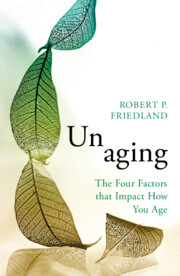Book contents
- Unaging
- Reviews
- Unaging
- Copyright page
- Dedication
- Contents
- List of Figures and Tables
- Preface
- Part I Foundations: What Do We Need to Know about Optimal Aging?
- 1 Aging Is Not Inevitable, It Is an Opportunity
- 2 The Theory of the Multiple Reserve Factors
- 3 The Brain Is Not an Organ, It Is the Master
- 4 Memory and Cognition
- 5 The Neurodegenerative Diseases of Aging
- 6 Stroke and Vascular Cognitive Impairment
- 7 Other Dementias
- 8 Our Microbiota and How to Do Gene Therapy in the Kitchen
- 9 The Health of the Body and the Physical Reserve Factor
- 10 Depression, Anxiety, and What Good Is Feeling Bad?
- 11 Genetics Aren’t Everything
- Part II Applications: What Can We Do about the Opportunity of Aging?
- Part III Conclusions
- Acknowledgments
- Glossary
- References
- Index
2 - The Theory of the Multiple Reserve Factors
from Part I - Foundations: What Do We Need to Know about Optimal Aging?
Published online by Cambridge University Press: 15 September 2022
- Unaging
- Reviews
- Unaging
- Copyright page
- Dedication
- Contents
- List of Figures and Tables
- Preface
- Part I Foundations: What Do We Need to Know about Optimal Aging?
- 1 Aging Is Not Inevitable, It Is an Opportunity
- 2 The Theory of the Multiple Reserve Factors
- 3 The Brain Is Not an Organ, It Is the Master
- 4 Memory and Cognition
- 5 The Neurodegenerative Diseases of Aging
- 6 Stroke and Vascular Cognitive Impairment
- 7 Other Dementias
- 8 Our Microbiota and How to Do Gene Therapy in the Kitchen
- 9 The Health of the Body and the Physical Reserve Factor
- 10 Depression, Anxiety, and What Good Is Feeling Bad?
- 11 Genetics Aren’t Everything
- Part II Applications: What Can We Do about the Opportunity of Aging?
- Part III Conclusions
- Acknowledgments
- Glossary
- References
- Index
Summary
We need to have three goals for aging. The first two are clear; survival and avoiding disease. Equally important is a third goal, to maintain fitness and a high level of four reserve factors. These reserve factors allow us to successfully respond to the challenges we face as we age. Cognitive reserve is the capacity to maintain effective cognitive function despite age-related changes in the brain. Maintaining high cognitive reserve is not our only goal. We must also maintain high physical, psychological, and social reserves. Physical reserve reflects the capacity of all our body systems. Psychological reserve is our ability to maintain healthy mental function, and social reserve describes our interpersonal network and supports. With aging, our ability to function is dependent upon the interaction of these four reserve factors. Our capacity to respond well to adversity is called resilience and is a fundamental goal of aging. It is important to realize the critical nature of these four reserve factors because through our actions we can enhance our capacity for resilience and enhanced fitness with aging.
- Type
- Chapter
- Information
- UnagingThe Four Factors that Impact How You Age, pp. 25 - 41Publisher: Cambridge University PressPrint publication year: 2022

